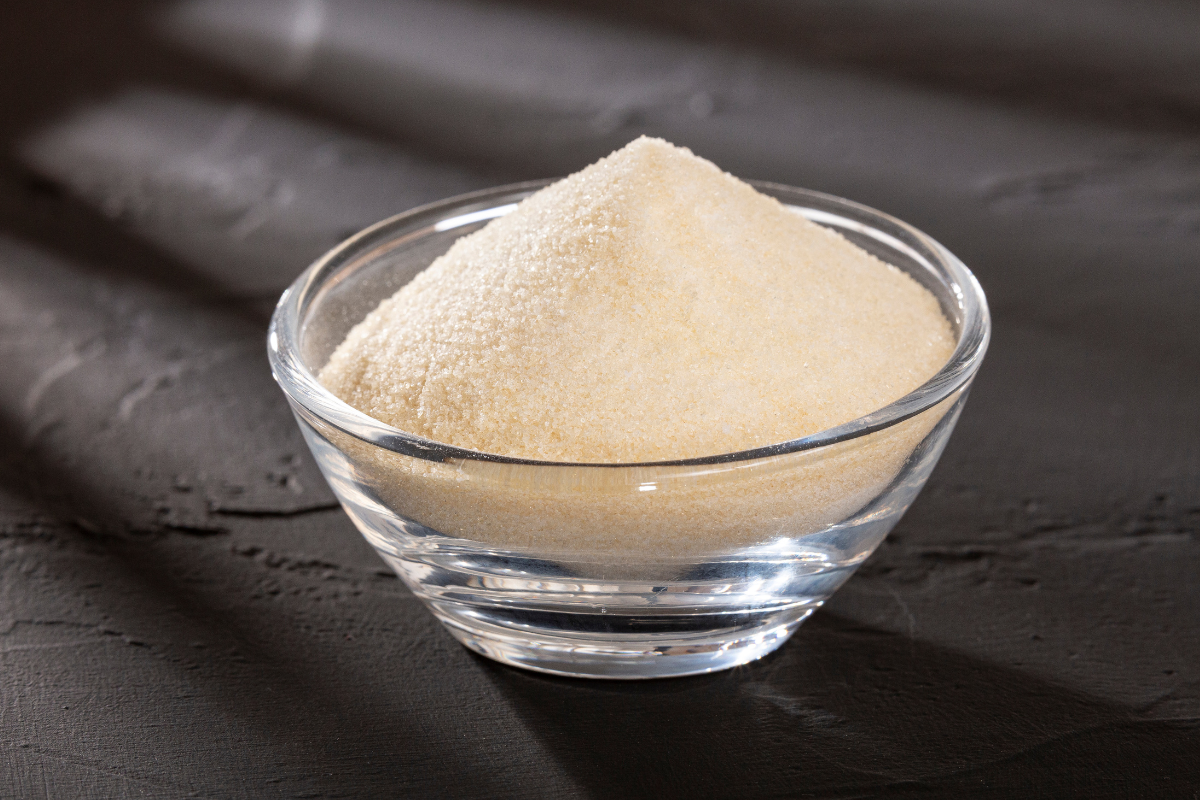Collagen for health & beauty

Collagen for health & beauty
What if there was a nutrient that could slow down the aging process, build more muscle, keep your joints healthy, and improve your sleep? It may sound too good to be true, but there are actually quite a few scientific studies that speak in favor of the protein collagen. Collagen is widely known for its anti-aging effects on the skin, but this protein actually has even more benefits for the human body.
What is collagen?
Collagen is a type of protein that is naturally found in the body. There is more collagen than any other type of protein in humans, and it makes up a whopping 30% of all the proteins in the body. Collagen gets its name from a Greek word that means “glue,” which makes sense, since collagen is essentially what holds our bodies together. Collagen is found in the skin, joints (ligaments, tendons, and cartilage), and even bones and muscles, to name a few places in the body where this protein is found.
Collagen contains the conditionally non-essential amino acids glycine, proline, and arginine. It also contains the amino acid derivative hydroxyproline. Conditionally non-essential amino acids are those that are normally produced by the body, but there are cases when your body may need more than it can produce on its own. In such a case, you may benefit from consuming a collagen supplement. These amino acids are the reason why collagen supplements have so many benefits.
So what can collagen do for you?
Can collagen help with digestion?
People are usually not aware of the benefits that collagen has for digestion.
The glycine content in collagen has been shown to promote the growth of bifidobacteria, a good type of probiotic bacteria. Good bacteria are responsible for digesting the food we eat, absorbing the nutrients in the food, and fighting off bad bacteria that can cause disease in the body.
Studies also show that glycine may help protect the gut by fighting swelling and inflammation often seen in IBD (inflammatory bowel disease). Additionally, glycine has been shown to protect the small intestine during endotoxemia, a condition in which endotoxins in the blood can cause bleeding and cell death.
This shows that collagen is important not only for aiding digestion, but also for protecting the digestive tract from disease and injury.
Can collagen build bigger and stronger muscles?
If you are an athlete or bodybuilder, you should be interested in the fact that collagen can help build bigger and stronger muscles. Two studies were conducted by German and Japanese researchers to test this.
A German study was conducted on men, using collagen peptides versus placebo. For three months, they consumed collagen peptides and did regular resistance training. In the end, the men in the collagen group had a greater increase in muscle mass.
Another study by Japanese researchers tested whether a combination of hydroxyproline and glycine from collagen peptides, among others, could be the reason for the German study results. They tested this on muscle cells and found that the cells actually got bigger from the collagen supplement.
As if bigger muscles weren't enough, the arginine content in collagen also plays a role in training. Studies have also been conducted on this amino acid and concluded that arginine taken during training increases both strength and body mass and reduces the breakdown of collagen. In addition, arginine stimulates the production of growth hormone, which is responsible for muscle growth.
Can collagen benefit weight loss?
Remember the German study with men in the text above? Another result from this study showed that the people who consumed collagen peptides also burned more body fat. Aside from this; by consuming extra amounts of protein from collagen supplements, you feel full faster when consuming collagen, which in turn reduces appetite. Lower calorie intake generally means weight loss over time.
Is collagen important for healthy and strong joints?
Research has shown that collagen can reduce joint pain. A study was conducted on athletes who suffered from chronically painful joints. After consuming collagen for 24 weeks, their pain was significantly reduced compared to the placebo group.
Collagen also effectively relieves arthritis. An experiment was conducted on rats with osteoarthritis, which consumed supplemental collagen for 90 days. The results were reductions in pain and increased mobility. Collagen as a treatment for rheumatoid arthritis (RA) was also tested on RA sufferers. After 24 weeks, they showed positive improvements without any side effects.
So, apart from helping with muscle and bone development, collagen also helps treat joint conditions. This is good not only for those suffering from diseases, but also for those who exercise hard and routinely push their joints to their limits. The less joint pain you experience, the more time and energy you can devote to exercising more often and more effectively.
Can collagen speed up wound healing and recovery?
Another study found that the amino acid proline, which is also found in collagen, helps with wound healing. In the study, the researchers tested this on rats with wounds of the same size. The first group was given proline orally, the second group had proline applied directly to the wounds, and the third group was given no proline. The wounds healed after 15 days, 10 days, and 20 days, respectively.
Another study further concluded that collagen plays an important role throughout the wound healing process. These findings are the reason why collagen dressings are now available for medical use.
Is collagen important for youthful skin?
Collagen can help reduce the physical signs of aging, such as wrinkled skin. While aging is a natural process and cannot be completely avoided, some people show signs of it at an earlier age than others. Gray hair can be easily covered by coloring your hair, but wrinkles and dry skin that has lost its elasticity and youthful glow require much more effort; some just let it be. But what if there was another way to counteract this?
Collagen is best known as a protein that reduces signs of aging, as well as a protein that has beautifying effects. An extensive study was conducted on these claims. In one study, 300 people from different countries were asked to test the effects on signs of aging in the skin after taking a collagen supplement. The study showed positive results for the skin, with higher collagen density and improved skin firmness. The subjects who had wrinkles and those who had signs of aging in photos showed significant improvements. The subjects also showed improvements in skin hydration, as well as a reduction in the depth of the wrinkle/line from the corner of the nose to the mouth. You may not be able to escape aging, but with collagen you can at least delay it.
Can collagen improve sleep?
This is another benefit you probably wouldn’t expect from collagen. When you sleep, you go through different levels of sleep, from stages 1 to 4. Stages 1 and 2 are very light sleep and you can easily wake up from these stages. Stage 3 is a deep sleep stage, while the 4th stage is REM sleep, where dreams usually occur.
The deep sleep stage is when your body rests and recovers. It is a very important sleep stage that you must go through in order to perform well the next day. This stage also releases growth hormone into your body, which is what drives your muscle growth.
However, some people are unable to enter deep sleep due to health conditions or different habits. For example, consuming caffeine too late in the evening can interfere with your body being able to reach deeper stages of sleep, such as stage 3. This causes drowsiness during the day and an inability to concentrate.
A study was conducted on the effects of collagen intake on sleep patterns. According to this research, people who took collagen before bed reported better sleep, and of better quality. The measurements also showed that the subjects fell asleep faster and reached deep sleep faster than those who took a placebo. It was also found that they did not feel tired during the day and had good mental performance.
Which collagen supplement is best?
After reading about all the benefits of collagen, you're probably wondering where you can get collagen? The good news is that your body already naturally produces collagen. The bad news is that your body's collagen production decreases as you get older, in fact as early as the age of 25. Therefore, you should consume a collagen supplement if you feel that your body could benefit from increased intake.
While it's not absolutely necessary to take collagen, it's overall very beneficial. It's not only good for a youthful appearance, but also good for mental health, digestion, and your musculoskeletal health. Plus, a good night's sleep will keep fatigue at bay and ensure your muscles get the recovery they deserve to build muscle!
- Tags: Hud/Skin Kollagen/Collagen











